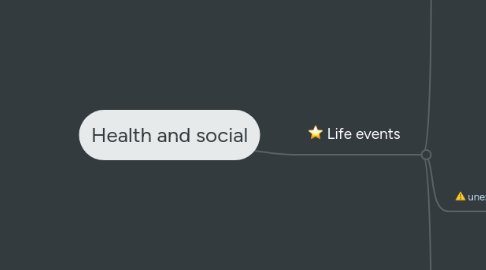
1. Life events
1.1. expected life events
1.1.1. starting compulsory education
1.1.1.1. Positive: - Build new friendships - Learn and develop new skills - Improved self-esteem
1.1.1.2. Negative: - Anxiety about new routines and meeting new people - Young children may feel insecure when first leaving parents
1.1.2. Getting a new job
1.1.2.1. Positive: - Develop independence - Improve self-image and self-esteem - Build new relationships - Learn new skills
1.1.2.2. Negative: - Stress and anxiety
1.1.3. Living with a partner/ getting married/ entering a civil partnership
1.1.3.1. Positive: - Feel secure and content - Develop intimate relationships
1.1.3.2. Negative: - Loss of independence - Have to share
1.1.4. moving house or area
1.1.4.1. Positive: - Excited by a new challenge - Develop new friendships/relationships
1.1.4.2. Negative: - Loss of friends - Anxiety and stress of moving - May feel isolated
1.1.5. Becoming a parent
1.1.5.1. Positive: - Feel content - Improved emotional well being - Develop strong attachments
1.1.5.2. Negative: - Worry about responsibility - Feel tired - Loss of independence
1.1.6. Retirement
1.1.6.1. Positive: - Reduced stress - Socialise more with family and friends
1.1.6.2. Negative: - Loss of relationships - May have negative self-image - May lose mobility/fitness
1.2. unexpected life events
1.2.1. Accidents injury or ill health can lead to:
1.2.1.1. Loss of mobility
1.2.1.2. Depression
1.2.1.3. Restriction in social activities
1.2.1.4. A lack of interest in appearance
1.2.2. Death of a partner, relative or friend can lead to:
1.2.2.1. A feeling of loss and grief
1.2.2.2. Low self-confidence
1.2.2.3. Loss of friends
1.2.2.4. Unable to cope/function at work
1.2.3. Exclusion/dropping out of education can lead to:
1.2.3.1. Low self-esteem
1.2.3.2. Loss of friends
1.2.3.3. Restriction in social activities
1.2.4. Imprisonment can lead to:
1.2.4.1. Depression
1.2.4.2. Loss of social contact
1.2.4.3. Low self-esteem
1.2.4.4. Loss of independence
1.2.5. Promotion can lead to:
1.2.5.1. Improved self-esteem
1.2.5.2. Positive self-image
1.2.5.3. More independence
1.2.6. Redundancy can lead to:
1.2.6.1. Low self-esteem
1.2.6.2. Stress
1.2.6.3. Fewer opportunities for learning and developing skills
1.2.6.4. Fewer opportunities to interact with people
1.2.6.5. Opportunities to train for a new job
1.3. Support
1.3.1. Formal
1.3.1.1. Provides for health needs such as prescribing medication or changing dressings
1.3.1.2. Advising and helping with exercise to improve mobility
1.3.1.3. Referring people to other services that can help
1.3.1.4. Counselling to give people the opportunity to talk about their worries
1.3.1.5. Advising individuals and their family about a health or social problem and ways to improve own health and welfare
1.3.1.6. Liaising with other professionals to provide care
1.3.1.7. Managing expectations about health and welfare
1.3.2. Informal
1.3.2.1. Support to maintain independence
1.3.2.2. Reasurance
1.3.2.3. Help in coping with change
1.3.2.4. Support with coming to terms with changes in health or circumstances
1.3.2.5. Help with day-to-day tasks, such as shopping and cleaning
1.3.2.6. Help with washing and dressing
1.3.3. voluntary support
1.3.3.1. Voluntary organisations
1.3.3.2. Community groups
1.3.3.3. Religious groups
